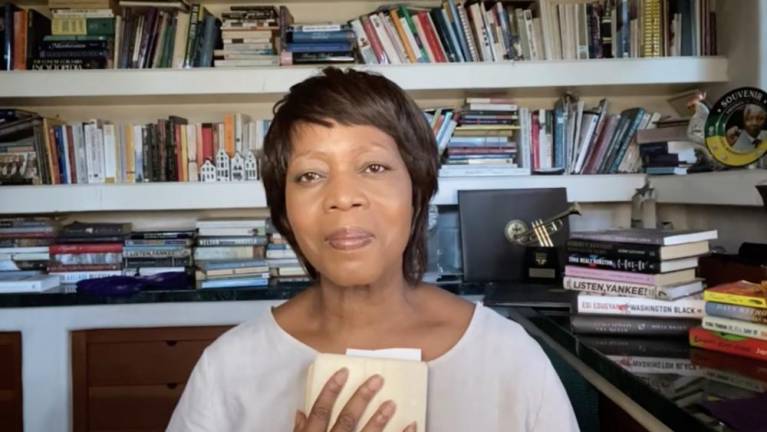The Rooms Where Things Happen
As we hunker down at home, the theater community is stepping up to give us original works that resonate deeply

“Artistry is also a spirit, a secret room in the soul. The room becomes an anywhere, a forest, an ocean, a prison cell, a fairyland ... ” - Joseph O’Connor, “Shadowplay”
Lin-Manuel Miranda rapped about Jefferson, Madison and Hamilton’s secret meeting in the one where it happened. The Beach Boys sang longingly about it being a world where they can go to tell their secrets. Brie Larson won an Oscar for playing a hostage in one with her young son.
Yes, I am speaking of the rooms of our lives, which have never had more meaning than at this moment. As we hunker down in ours, the theater community is stepping up — once again — to give us original stories that resonate deeply. Among the recent offerings are “The Bedroom Plays,” “The Living Room Plays,” The Bathroom Plays” and “One Room.”
The latter, which comes from the Weston Playhouse in Vermont, was comprised of 14 monologues, (average 10 minutes) and some recognizable actors, including Alfre Woodard, Dana Delaney, Daphne Rubin-Vega, and Josh Hamilton.
“Theater From Our Bedrooms”
The motivations behind these came from stalled creativity mixed with a desire to help others. Cassandra Pappas, part of the Eden Theater Company, said, “The idea came from a quiet moment when our production team sat on a Zoom meeting feeling sad we couldn’t just make theater from our bedrooms. Soon into quarantine, we had our minds reeling with the possibilities of telling stories that have one thing in common: the rooms that we are stuck in. And perhaps even watched in.”
One might think seeing the responses on home screens would make viewers feel even lonelier or more depressed. Apparently not. “The feedback we’ve received so far has been overwhelmingly one of gratitude,” says Susanna Gellert, the Executive Artistic Director of the Weston. “Were it possible to feel an audience lean in and listen together, that is what we’ve felt.”
The playwrights were simply asked, ”What stories might be hiding in a home’s ordinary rooms?” They also felt thankful, as they sought ways to put their own current, and very personal, emotions in actors’ mouths.
“My long-term relationship ended a week before the lockdown, so the experience of quarantine was less about an invisible virus and more about an invisible partner,” says Brennan Vickery, who penned “Monogamous Animals” for the Eden Theater Company’s “The Bathroom Plays.”
“The piece looks at relationships ending, not simply because of the stay at home order, but because that order does not consider whom you’re staying with or who is not staying with you,” says Vickery.
Black Lives Matter Movement
Vichet Chum wrote “Front and Back” for the Weston and says the assignment “was a balm during a difficult time, when our itty-bitty places become even more sacred. Writing this piece has afforded me the opportunity to expand that space just a little more.” Likewise, E.E. Adams’ playlet, “Mary,” for “Bathroom Plays,” turned out to be a gift at just the right time. “I was dealing with a nasty bout of writer’s block and I knew having a deadline would help break it,” she says. “In writing, I was able to give voice to one of my fears: the self-policing and self-erasure sometimes done by black people to survive.”
These timely original works not only take us inside places of isolation, but many also touch on the Black Lives Matter movement which was (and is) happening. Amy Berryman was certainly aware of the exploding city streets while writing “Pigeons” for the Eden. “In these traumatic times — so many deaths by a disease we know so little about — plus the revolution of BLM, it seems to me that people are turning to conspiracy theories almost as solace. I wanted to get in the mind of someone who might be experiencing such a trauma.”
While free for viewers, (and available on YouTube) the theaters are always open to donations. Admirably, the Eden asked for contributions to go to Bryan Stevenson’s Equal Justice Initiative in Alabama.
These lovely pieces are worth watching: you will relate; you will see — and support — really fine actors reading the words of really fine playwrights. “Huge important ideas are out there, but there are few or no opportunities for artists to take those ideas and transform them into art and practice,” says Gellert. “In some small way, we wanted to provide a canvas for that.”
Indeed they have, and as playwright Vichet Chum notes, “I hope these works make us all feel a little less alone.”
The playwrights were simply asked, ”What stories might be hiding in a home’s ordinary rooms?”